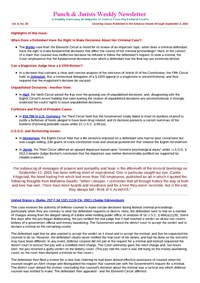This case is particularly noted for Judge Moore's dissent in which she disagreed with the majority's "close enough" approach of approving the admission of business records under Rule 807 (the residual exeception rule) after failing to meet Rule 803(6).
One of the many issues raised on appeal by the defendant in this case was his claim that the Supreme Court’s decision in Apprendi v. New Jersey, 430 U.S. 466 (2000) rendered 21 U.S.C. facially unconstitutional. In rejecting that claim, the Court reasoned as follows:
“The Apprendi decision required …
Some differing views on whether the Federal judiciary is so overloaded with work that it justifies the growing use of unpublished decisions.
Quote of the Week - Two views on whether there are too many cases and too few judges
“Recent figures tell a striking story. In 1999, …
In this lengthy decision, the Ninth Circuit has jumped into the long-simmering debate over the growing use of unpublished decisions by the courts - a topic that we have frequently addressed. (See “Unpublished Decisions - The Background”, P&J, 8/7/00). The Ninth Circuit is the largest appellate court in the …
Here, citing Tyler v. Cain, 121 S. Ct. 2478 (2001), the Court held that Apprendi has not been made retroactive to cases on collateral review by the Supreme Court such that a defendant may file a second habeas corpus application in the District court.
The petitioner in this …
Here, over the dissent of Judge Batchelder, the en banc court vacated the prior panel's decision (reported at 227 F.3d 660) which held that portions of the Child Support Recovery Act (CSRA) were unconstitutional as an improper exercise of Congress' Commerce Clause authority, based upon the Supreme Court's decision …
Sentencing based on largest quantity of precursor chemicals in methamphetamine case is not a "harmless error" under Apprendi, thus jury must determine drug quantity.
Here the Court held that the defendant's 32 year sentence exceeded the statutory maximum allowed by 21 USC § 841(b)(1)(C) for drug offenders involving …
The claimants in this case, Allan Johnson and Jermaine Thomas, were stopped for a traffic violation while driving in a highway outside of Wilmington, DE. The police officer became suspicious about them when she detected a strong odor of air freshener and observed that they avoided making eye contact …
In this case, the Third Circuit gave a broad and far-reaching interpretation of the conditions under which a district court may impose an upward departure at sentencing because a victim has suffered “extreme psychological injury” within the meaning of U.S.S.G. § 5K2.3. That provision, a policy statement, provides that …
The defendant in this case was convicted of various drug charges and sentenced to 135 months in prison. After his conviction and sentence were affirmed on direct appeal, he timely filed a motion, pursuant to 28 U.S.C. § 2255, to vacate, set aside, or correct his sentence on a …
This case is noted for its review of an important topic: when does a criminal defendant have the right to make fundamental decisions that affect the course of her criminal proceedings - and the Court answered: only in limited circumstances.
This case involves the authority of defense counsel …
Here the Court rejected the defendants' contention that the Apprendi rule required the jury to determine whether they intended to create D- or L-methamphetamine, since that determination would not have affected their statutory maximum.
Although Judge Clay agreed that the district court's enhancement of the defendant's sentence for crack-cocaine under 21 U.S.C. § 841(b)(1) should be affirmed, he also forcefully argued that "Apprendi requirements apply to a defendant who, as in this case, was deprived of the opportunity to receive less than the …
Here the Court held that the term "distribution" as ussed in USSG § 2G1.1(b)(2) includes purely gratuitous distribution of child pornography and does not have to include the receipt of money or other valuable gain for the enhancement to apply.
The defendant in this case appealed his sentence …
As stated by the Court: "This case presents a question this court previously reserved: what is the standard to be applied to a criminal defendant's motion for a new trial where the claim is that the prosecution knowingly used perjured testimony." (Id., at 18).
In this case, the defendant …
An Arkansas state jury sentenced Grover Henderson to life imprisonment for selling .238 grams (that’s one-fifth of a gram - or .0084 ounces!!!) of cocaine base - and it was the first offense of which he had ever been convicted. (Arkansas is one of four states - the others …
